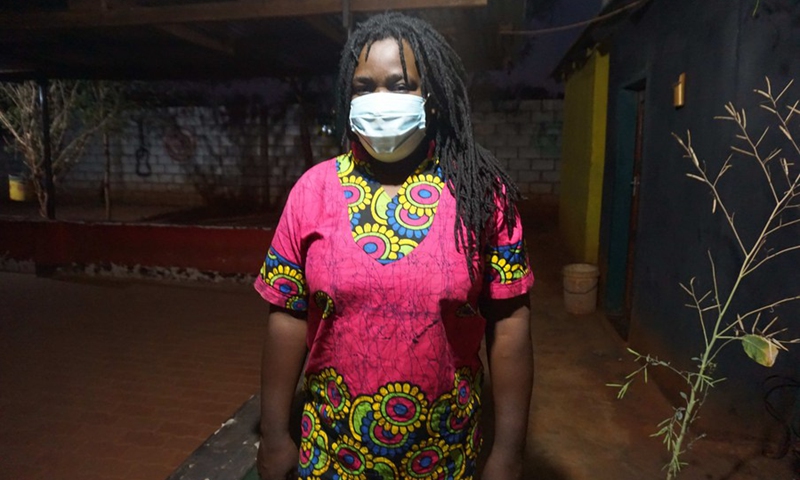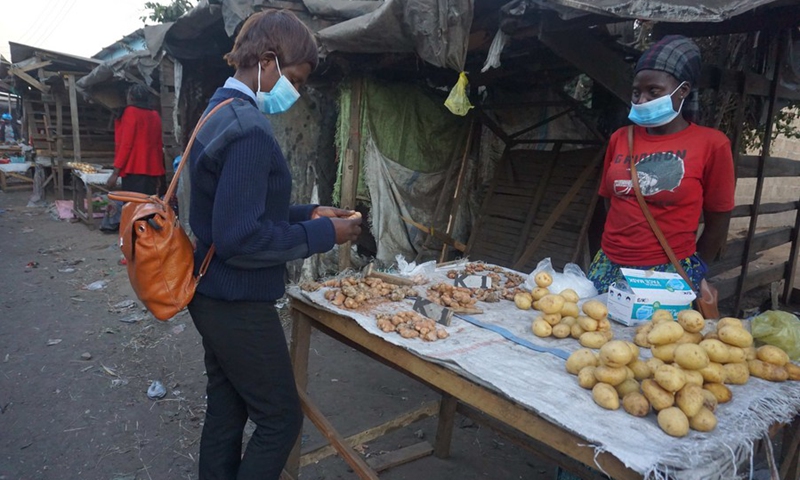
Zambian music artiste Daputsa Nkhata-Zulu poses for a photo after explaining the importance of wearing a face mask correctly in the Chibombo district, central Zambia, on July 3, 2021.(Photo: Xinhua)

Naomi Kakoma (R), a 27-year-old trader at Lupili market, sells fresh ginger in Lusaka, Zambia, on June 27, 2021.(Photo: Xinhua)
It is a bright Sunday morning and 7-year-old Grace Chimdidi and her elder sister 17-year-old Chiyembekezo Chimdidi, are preparing to visit their grandparents in Chazanga, a peri-urban area in Zambia's capital Lusaka.
Grace is always ecstatic about visiting her grandparents who live a few kilometers from her home. A visit to their grandparents is an opportunity for her to climb trees and eat roasted maize among other things.
For Chiyembekezo going to Chazanga entails having a free fancy hairdo done by one of her aunts, something that she has always looked forward to whenever she is around her grandparents' place.
"Please remind your grandfather about the vegetable seedlings I requested for and don't forget to carry them along on your way back," said the children's mother as the two sisters headed to a nearby bus station.
No sooner had they reached the station than a minibus stopped and they quickly got on board. Within minutes, the two children were at their grandparents' place.
Once inside the premises, elated Grace rushed to knock on the front door that was quickly answered by her grandfather, 72-year-old Kasuli Chenje, who seemed somewhat perturbed to see the duo.
Instead of welcoming the children in, Chenje stood in the doorway and asked Chiyembekozo and Grace to take a few steps backward while he reached for his mobile phone which was in one of his pockets. He swiftly dialed a number.
"We will not be receiving any visitors for a while. We have had too many funerals in our compound and so it will not be wise to allow Chiyembekezo and Grace inside the house. Sorry, I will have to send them back," he said as he ended the brief phone conversation.
He turned to look at the two and said that "sorry I cannot allow you inside the house or around this place. I have already spoken with your mother and she understands why that is so. Please go back home."
Chiyembekezo and Grace left their grandparents' house both confused and disappointed at the turn of events. The girls got in a taxi and headed back home without saying much.
"It seemed as though he was suggesting that my sister and I were carrying the coronavirus," said Chiyembekezo, after days of that sad episode at their grandparents' place. "I think he was only trying to protect himself and us because anyone can pass on the virus without knowing and there is no sure way of telling who has it who and who doesn't," she added.
The story of Chiyembekezo and Grace exemplifies what is currently happening in a number of communities in Zambia today. With the third wave of COVID-19 taking a toll on society, households are not only fearful of welcoming visitors but also unsure of how to handle the social dilemmas brought about the pandemic.
Individuals continue to recount how the pandemic has greatly affected their lives particularly its social aspects.
"COVID-19 has really shown us the unimaginable. Who would have thought that for one to attend a funeral ceremony of a relation or friend they would need to be invited," said 35-year-old Tobias Mumba, a resident of Lusaka.
He went on to recount how he was denied the privilege of attending a friend's funeral in June this year. After days of waiting for an invitation to attend the funeral of the said friend, Mumba tried to gatecrash but failed.
According to Zambian sociologist Mwiya Mataa, physical interactions have been an essential part of human social experience, and are particularly important for the social development of young people.
Mataa who is a lecturer at the University of Zambia, said in response to the COVID-19 situation, societies will need to adopt new values and new norms in order to survive.
"But we must ensure that we disseminate accurate information about COVID-19 so that individuals fully appreciate that it is in their best interest not to, for instance, attend a funeral physically," he explained.
He further emphasized the need to continue investing in technology noting that physical interactions are diminishing and people the world over are relying more on technology to stay connected with friends and family.
"We now have to value virtual interactions," Mataa stressed.
